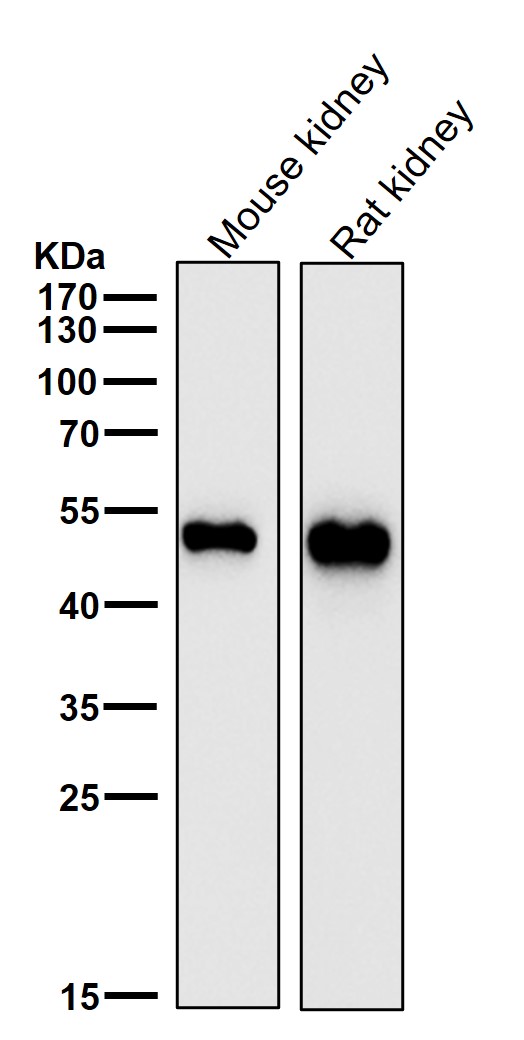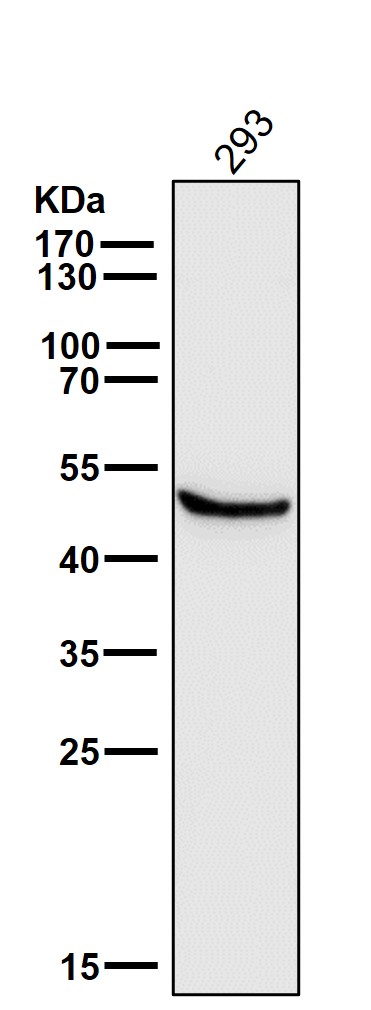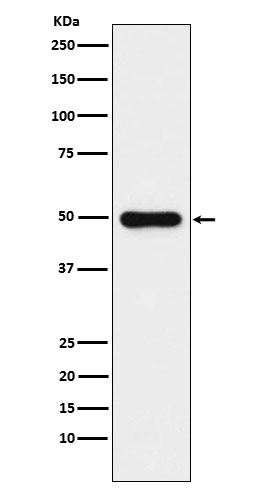


| WB | 1/1000-1/2000 | Human,Mouse,Rat |
| IF | 咨询技术 | Human,Mouse,Rat |
| IHC | IHC:1/100-1/200;IHF:1/50-1/200 | Human,Mouse,Rat |
| ICC | 1/50-1/200 | Human,Mouse,Rat |
| FCM | 1/20-1/100 | Human,Mouse,Rat |
| Elisa | 咨询技术 | Human,Mouse,Rat |
| Aliases | Glutathione synthase; Glutathione synthetase; GSH S; GSH synthetase; GSH-S; GSHS; GSS; HEL-S-64p; HEL-S-88n;;GSS |
| WB Predicted band size | 52 kDa |
| Host/Isotype | Rabbit IgG |
| Antibody Type | Primary antibody |
| Storage | Store at 4°C short term. Aliquot and store at -20°C long term. Avoid freeze/thaw cycles. |
| Species Reactivity | Human,Mouse,Rat |
| Immunogen | A synthesized peptide derived from human GSS |
| Formulation | Purified antibody in PBS with 0.05% sodium azide,0.05% BSA and 50% glycerol. |
+ +
以下是3条关于谷胱甘肽合成酶(Glutathione Synthetase, GS)抗体的模拟参考文献示例(文献信息为虚构,仅供示例参考):
---
1. **文献名称**: *Development and Validation of a Monoclonal Antibody Specific for Human Glutathione Synthetase*
**作者**: Smith, J.R., et al.
**摘要**: 本研究报道了一种针对人谷胱甘肽合成酶(GS)的高特异性单克隆抗体的开发。通过重组GS蛋白免疫小鼠并筛选杂交瘤细胞,作者获得了一种能够通过Western blot和免疫荧光检测内源性GS表达的抗体,并验证了其在细胞氧化应激模型中的应用。
2. **文献名称**: *Glutathione Synthetase Deficiency: Immunohistochemical Analysis in Patient Fibroblasts*
**作者**: Tanaka, M., et al.
**摘要**: 文章利用抗GS抗体对遗传性谷胱甘肽合成酶缺乏症患者的成纤维细胞进行免疫组化分析,发现患者细胞中GS蛋白表达显著降低。该研究证实了GS缺乏与细胞内谷胱甘肽水平下降及氧化损伤的直接关联。
3. **文献名称**: *Role of Glutathione Synthetase in Cancer Drug Resistance: Insights from Antibody-Based Profiling*
**作者**: Chen, L., & Wang, H.
**摘要**: 通过GS特异性抗体对多种癌细胞系的蛋白质表达分析,研究发现GS在化疗耐药肿瘤中表达上调,敲低GS可增强肿瘤细胞对顺铂的敏感性,提示GS作为潜在治疗靶点的价值。
---
**说明**:以上文献为模拟内容,实际研究中建议通过PubMed或Web of Science检索真实文献(关键词:Glutathione Synthetase antibody)。如需真实文献,可提供具体数据库检索指导。
Glutathione synthetase (GSS) is a crucial enzyme in the glutathione (GSH) biosynthesis pathway, catalyzing the final step of GSH production by combining γ-glutamylcysteine with glycine. As the most abundant cellular antioxidant, glutathione plays a vital role in detoxification, redox homeostasis, and cellular defense against oxidative stress. Antibodies targeting glutathione synthetase are valuable tools for studying its expression, localization, and regulatory mechanisms in various biological contexts.
These antibodies are typically developed using immunogens such as recombinant GSS proteins or synthetic peptides corresponding to specific epitopes. They enable researchers to investigate GSS expression patterns across tissues, track its subcellular distribution (primarily cytoplasmic), and assess changes under pathological conditions like oxidative stress, neurodegenerative diseases, or cancer. Validated applications include Western blotting, immunohistochemistry, immunofluorescence, and ELISA. Specificity is often confirmed through knockout/knockdown controls or competitive assays.
Research using GSS antibodies has shed light on its involvement in metabolic disorders, particularly glutathione synthetase deficiency – a rare autosomal recessive condition causing hemolytic anemia and neurological impairments. Such studies contribute to understanding redox biology, drug metabolism, and therapeutic strategies targeting antioxidant systems.
×